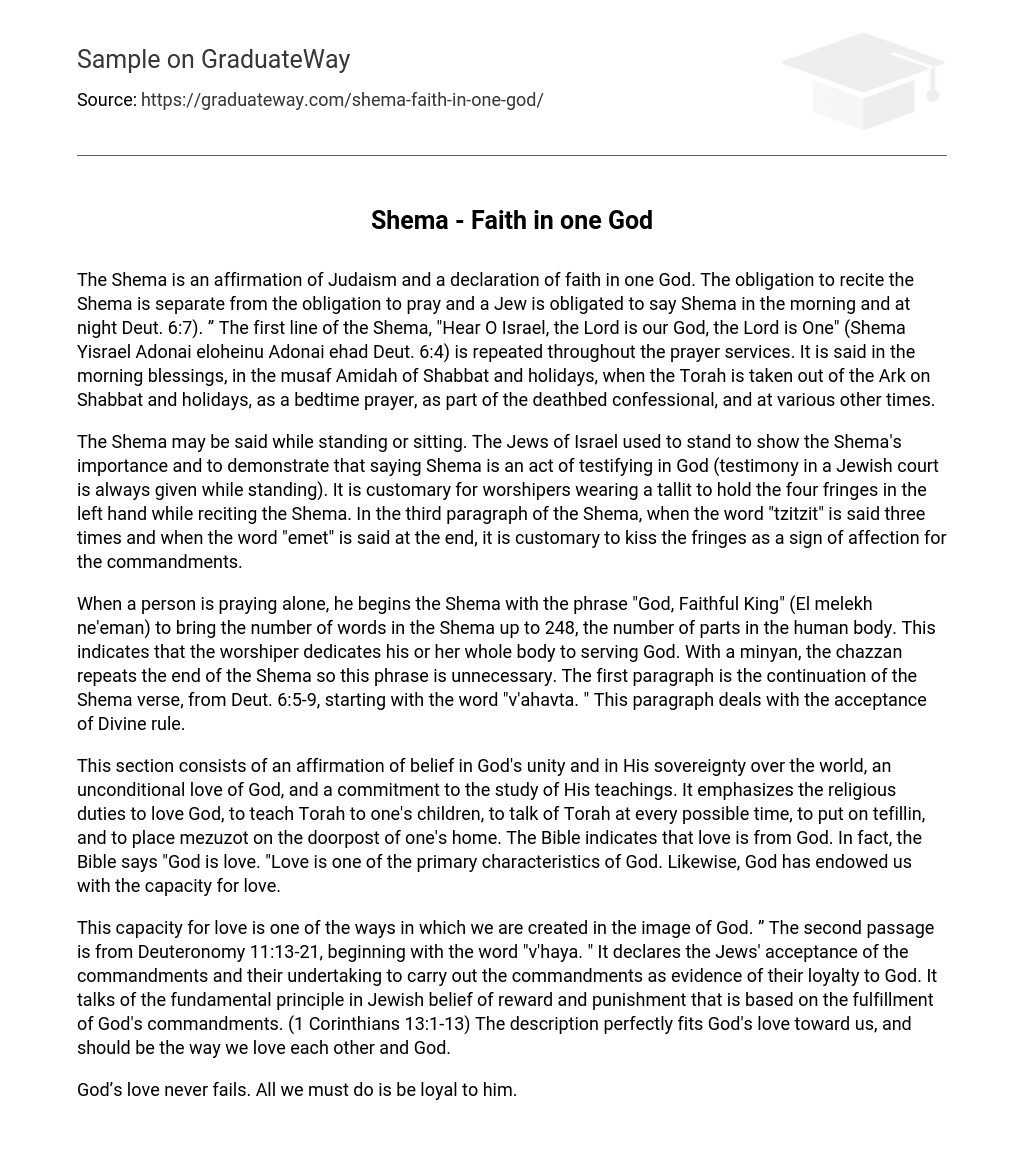The Shema is an affirmation of Judaism and a declaration of faith in one God. The obligation to recite the Shema is separate from the obligation to pray and a Jew is obligated to say Shema in the morning and at night Deut. 6:7). ” The first line of the Shema, “Hear O Israel, the Lord is our God, the Lord is One” (Shema Yisrael Adonai eloheinu Adonai ehad Deut. 6:4) is repeated throughout the prayer services. It is said in the morning blessings, in the musaf Amidah of Shabbat and holidays, when the Torah is taken out of the Ark on Shabbat and holidays, as a bedtime prayer, as part of the deathbed confessional, and at various other times.
The Shema may be said while standing or sitting. The Jews of Israel used to stand to show the Shema’s importance and to demonstrate that saying Shema is an act of testifying in God (testimony in a Jewish court is always given while standing). It is customary for worshipers wearing a tallit to hold the four fringes in the left hand while reciting the Shema. In the third paragraph of the Shema, when the word “tzitzit” is said three times and when the word “emet” is said at the end, it is customary to kiss the fringes as a sign of affection for the commandments.
When a person is praying alone, he begins the Shema with the phrase “God, Faithful King” (El melekh ne’eman) to bring the number of words in the Shema up to 248, the number of parts in the human body. This indicates that the worshiper dedicates his or her whole body to serving God. With a minyan, the chazzan repeats the end of the Shema so this phrase is unnecessary. The first paragraph is the continuation of the Shema verse, from Deut. 6:5-9, starting with the word “v’ahavta. ” This paragraph deals with the acceptance of Divine rule.
This section consists of an affirmation of belief in God’s unity and in His sovereignty over the world, an unconditional love of God, and a commitment to the study of His teachings. It emphasizes the religious duties to love God, to teach Torah to one’s children, to talk of Torah at every possible time, to put on tefillin, and to place mezuzot on the doorpost of one’s home. The Bible indicates that love is from God. In fact, the Bible says “God is love. “Love is one of the primary characteristics of God. Likewise, God has endowed us with the capacity for love.
This capacity for love is one of the ways in which we are created in the image of God. ” The second passage is from Deuteronomy 11:13-21, beginning with the word “v’haya. ” It declares the Jews’ acceptance of the commandments and their undertaking to carry out the commandments as evidence of their loyalty to God. It talks of the fundamental principle in Jewish belief of reward and punishment that is based on the fulfillment of God’s commandments. (1 Corinthians 13:1-13) The description perfectly fits God’s love toward us, and should be the way we love each other and God.
God’s love never fails. All we must do is be loyal to him. The third paragraph is from Numbers 15:37-41, beginning with the word “vayomer. ” It deals with the commandment of wearing tzitzit, which remind the wearer of God’s commandments. It mentions the exodus from Egypt, which Jews are obligated to refer to each day. The last word of the Shema, “emet” (truth) is actually part of the next blessing and is not part of the Biblical passage. It is said as part of the Shema so that one can declare, “Hashem, your God, is true” (Adonai eloheichem emet).
The Lord spoke to Moses, saying, “Speak to the children of Israel and tell them to make for themselves tzitzit (“fringes”) on the corners of their garments throughout their generations, putting a thread of blue upon the corner tzitzit. So that you remember and do all My commandments and be holy to your God. I am the Lord your God who brought you out of the land of Egypt to be your God; I am the Lord your God. Truth. I don’t know many human beings who can correctly define love or live out it’s meaning. Only love is eternal, since love will be the basis of eternal life.





